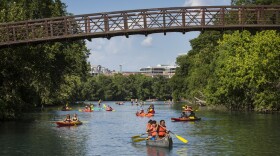The invasive zebra mussel has been moving south for years, leaving destruction its wake. Now, it’s in Lake Travis (update: and Lake Austin), and it will soon make its way downstream, changing the look, feel and maybe even the taste of Austin’s lakes forever.
At first glance, the mussels don’t look very threatening. They’re about the size of a nickel, with brown and yellow stripes. But in large enough numbers they wreak havoc.
You can sometimes find “thousands per square meter” says Robert McMahon, a mussel researcher at UT Arlington.
“They’re literally filtering the water over in a lake,” he says. “Depending on how dense it is, they might turn over all the water in a lake every week.”
That robs other small creatures of food. The creatures that eat those creatures then go hungry, and so on.
“It’s going to be a top-to-bottom change in the whole ecosystem,” says Liz Johnston, an environmental program coordinator with the city.
Going Clear
One of the more visible effects will be in water clarity.

“That’s what they’ve seen in northern lakes,” Johnston says. “It may look beautiful to people because it’ll be crystal clear and you'll think, ‘This is beautiful clean water,’ when really it’s not the way it’s supposed to be."
That clarity allows sunlight to reach deeper into the lake. That could encourage more plant growth, including invasive hydrilla and algae blooms that sometimes make our drinking water taste funny.
“If there’s a really bad bloom and the water’s clearer, it may actually make the lake blueish green at times,” Johnston says.
Shells That Cut And Clog
The arrival of zebra mussels might mean no more walking barefoot in or near waterways.
“They live quickly and die quickly,” Johnston says. “All of the shells will get deposited on the banks. They’re very sharp to walk on. … It will make any beaches along our reservoirs not pleasant to walk on barefoot.”
The mussels also clog water-intake pipes. In other places, utilities have spent millions of dollars dealing with them.
Lake Becomes Contagious
“If you have a boat in the water, they like to attach to hard surfaces,” Johnston says.
“On Lady Bird Lake, we don't have a lot of motor boats, but we do have people coming in and out on their standup paddle boards and kayaks that could potentially be transferred into other systems.”
That means, from now on, anyone who brings a boat to Austin’s lakes should wash it and let it dry, or risk spreading the mussels.
Barton Springs At Risk
Texas Parks and Wildlife recently found zebra mussels in Lake Austin, so it seems inevitable that Lady Bird Lake, which is downstream from Lake Travis as well, will host the invasive species soon enough. Decker Lake is fed by the same water, so it’s a safe bet the mussels will get there, too.
And, Johnston says, Barton Springs might even be at risk.
“Catfish could potentially disperse them upstream,” she says. “I’m also concerned about people who swim downstream of Lady Bird Lake at 'Barking Springs.' The larva could be attached to them. If they decide they want to go dip in the Barton Springs pool immediately, they could also transfer it there.”
The relatively nutrient-poor waters of Barton Springs may help protect it from the invaders, though, she says.
Nothing Can Be Done
Here’s the kicker: There’s no way to safely get rid of zebra mussels.
Looking for some good news?
Not every lake makes an ideal home for them, so it’s possible they won’t proliferate in Austin to the point where they cause maximum harm.
The thing is, we won’t know until they’re here – and that should be any day now.
Update: They're here.






